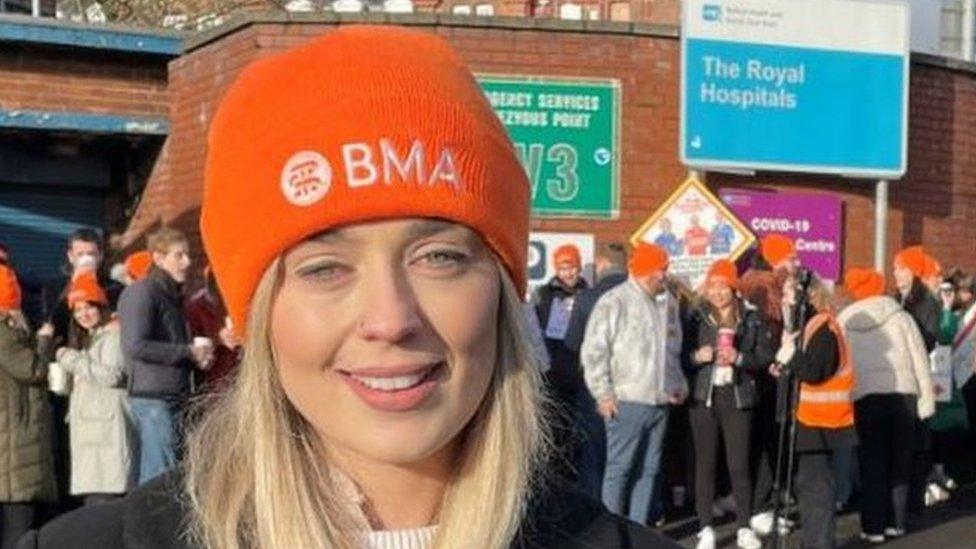Ongoing disruption as junior doctors walkout continues
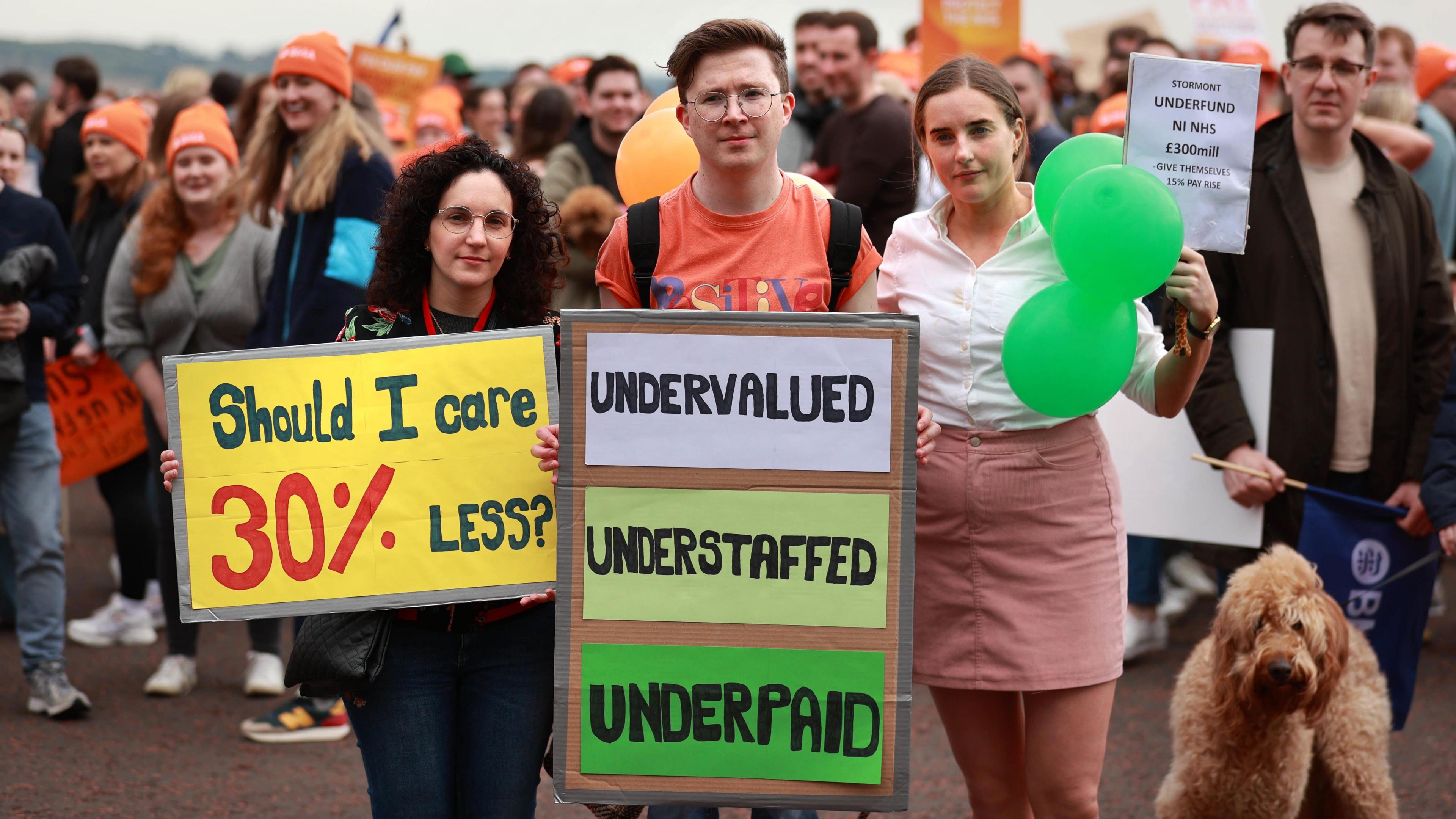
Dr Sarah Chetcuti, Dr Rhys Kelly and Dr Blanaid Canavan from Altnagelvin Hospital in Londonderry protesting outside Stormont on Thursday
- Published
A junior doctor in Belfast says she is actively looking for a “get-out plan” because of “deteriorating” working conditions in Northern Ireland.
Dr Edwina Hegarty is a trainee doctor in infectious diseases at the Royal Victoria Hospital.
A 48-hour walkout by junior doctors in Northern Ireland over a pay dispute continued on Friday.
The Department of Health (DoH) said patients are advised to expect "widespread disruption" to normal services.
The walkout ran from 07:00 BST on Thursday 6 June and will continue until 07:00 BST on Saturday 8 June.
It follows a 48-hour strike in May and a 24-hour strike in March.
Dr Hegarty said she and her husband are undertaking further training in Newcastle in England, but said she would be lying if she didn't acknowledge they were actively looking for their "get-out plan".
She told BBC Radio Ulster's Good Morning Ulster programme that she had seen a "year-on-year deterioration in the conditions that doctors are working in" and a corresponding deterioration in the conditions patients "are having to suffer".
She said she wanted to stay but it was looking increasingly difficult.

Dr Edwina Hegarty is a trainee doctor in infectious diseases at a Belfast hospital.
The strike has coincided with the launch of a new IT system in the Belfast Trust on Thursday, but the trust anticipated "minimal problems" on the day.
It said it considered changing the launch date, but as hundreds of appointments had to be rescheduled on 6 and 7 June because of industrial action, there was less pressure on the new system for the roll-out.
It said mitigations would be in place to support staff "to deliver safe and effective care over the strike period and into the weekend".
BBC News NI understands that elective activity is at 40% this week and is expected to increase to 50% next week.
The trust said it hopes to return to full elective activity by mid-summer.

Dr Fiona Griffin, chairwoman of the BMA Northern Ireland junior doctors committee, said Northern Ireland is losing doctors dues to poor pay
When the ballot for this industrial action was launched, junior doctors, like the rest of Northern Ireland’s health service staff, had received no pay award for 2023/24.
However, the DoH said a backdated 2023/24 pay award for junior doctors will be paid this month, "with its terms in line with the recommendations of the national pay review body, the DDRB".
This pay award involves an average pay increase of 9.07% for junior doctors in Northern Ireland, with those in their first year receiving a 10.68% uplift.
The current base starting salary for a junior doctor is about £26,000.
However, this does not take into account weekend or out-of-hours work.
Dr Fiona Griffin, chairwoman of the BMA Northern Ireland junior doctors committee, told BBC News NI that doctors pay had fallen by 30% over the last 15 years and that recommended pay uplifts did not bring doctors "anywhere close to pay restoration".
"Lots of our doctors are moving across the water to posts, a lot are going to Australia - that’s the sensible financial thing to do at the minute.
"So what we are saying time and time again is that we are losing doctors because we are not paying them properly."
Speaking from a rally at Stormont she said: "I would apologise to any patients for the impact this has had on them but what we are saying is that we would like there to be a health service with doctors five years from now and the way things are going that is not going ot be the case".
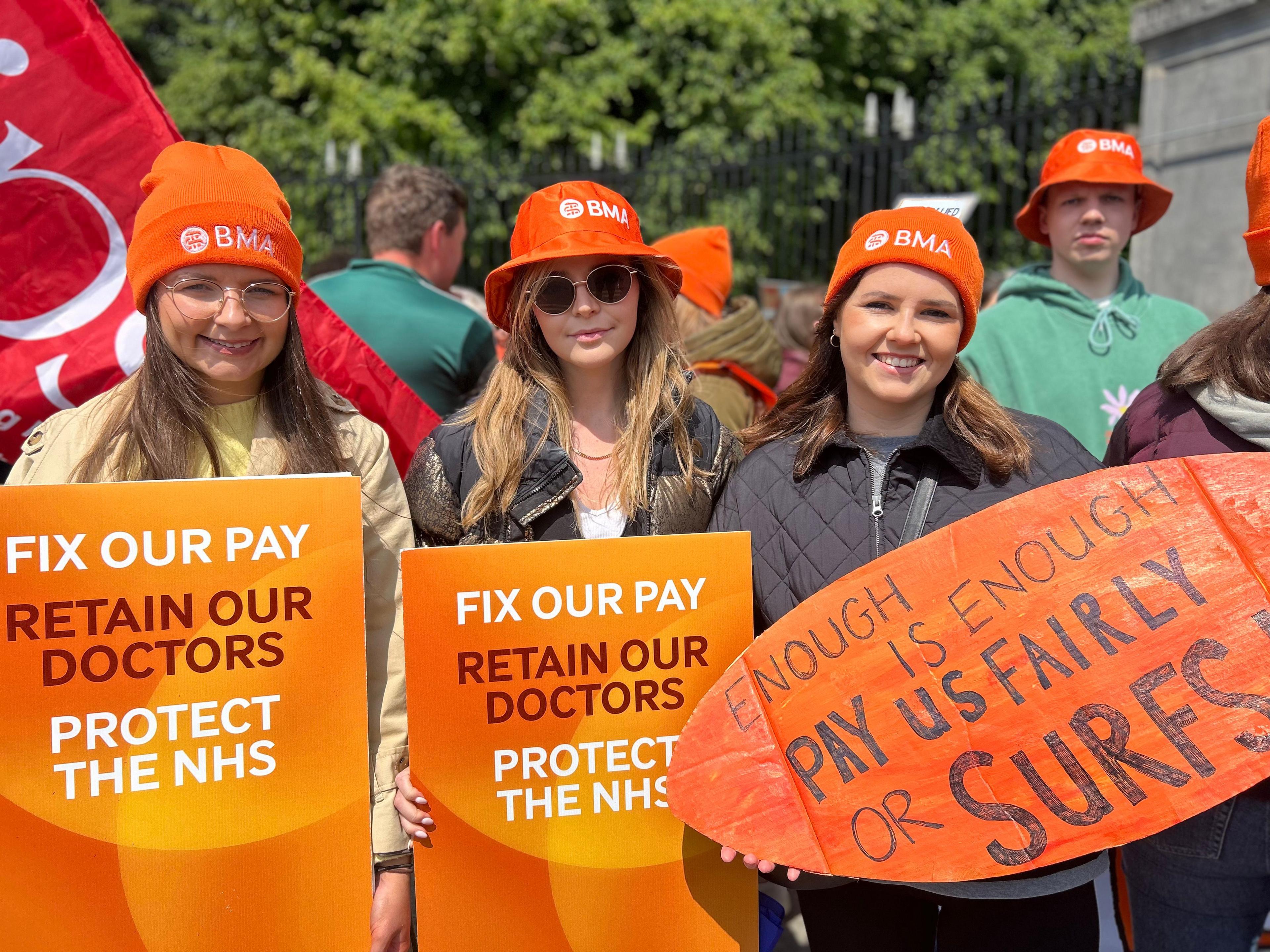
Junior doctors protest over pay at Stormont
At the scene: Reporter Claire Graham
Hundreds of junior doctors arrived at Stormont for a rally at 12:30 BST on Thursday as part of a 48-hour walkout over pay.
They tell me they do not want to be out on strike but say this is the "last tool in their arsenal".
Some have brought their children with them, with one mother telling me she wants a safe health service for future generations.
One junior doctor in her second foundation year explains she has just come off a 10-day stretch - exhausted.
The crowd is walking up the hill to parliament buildings for speeches.
What is a junior doctor?
Junior doctors are qualified doctors who are still involved in clinical training, according to the British Medical Association (BMA).
Patients may be treated by a junior doctor in a hospital or general practice setting.
All have completed a medical degree and can have up to nine years' of working experience as a hospital doctor or up to five years working and gaining experience to become a GP.
They work under the supervision of a senior doctor.
What services are affected?
Belfast Trust
468 outpatient appointments cancelled
Six inpatient/day case procedures cancelled
Southern Trust
152 outpatient appointments postponed
28 day cases postponed
South Eastern Trust - postponed services
258 outpatient appointments
311 radiology appointments
42 endoscopy procedures
34 day case procedures
772 outpatient appointments going ahead
Northern Trust
Outpatients appointments rescheduled 193
Endoscopy procedures rescheduled 8
Surgical procedures rescheduled 19
Western trust
1312 outpatient appointments postponed
95 inpatient/day case procedures postponed
New patient record system
Dr Johnny Cash from the Belfast Trust said he recognised and acknowledged junior doctors’ entitlement to strike but felt going live with the new patient record system on 6 June was "definitely the safest thing" for patients.
When asked if a downturn in services due to industrial action helped with encompass going live, Dr Cash said that was "certainly one way of looking at things".
Long term, it is hoped the new system will have a positive impact on waiting lists, but Dr Cash said it was "unfortunately inevitable" that there would be a "negative impact on waiting times while we roll this programme".
He said it has an "ambitious plan to return to normal activity, hopefully by mid-summer".
The South Eastern Health and Social Care Trust was the first trust to have its records digitised in Northern Ireland.
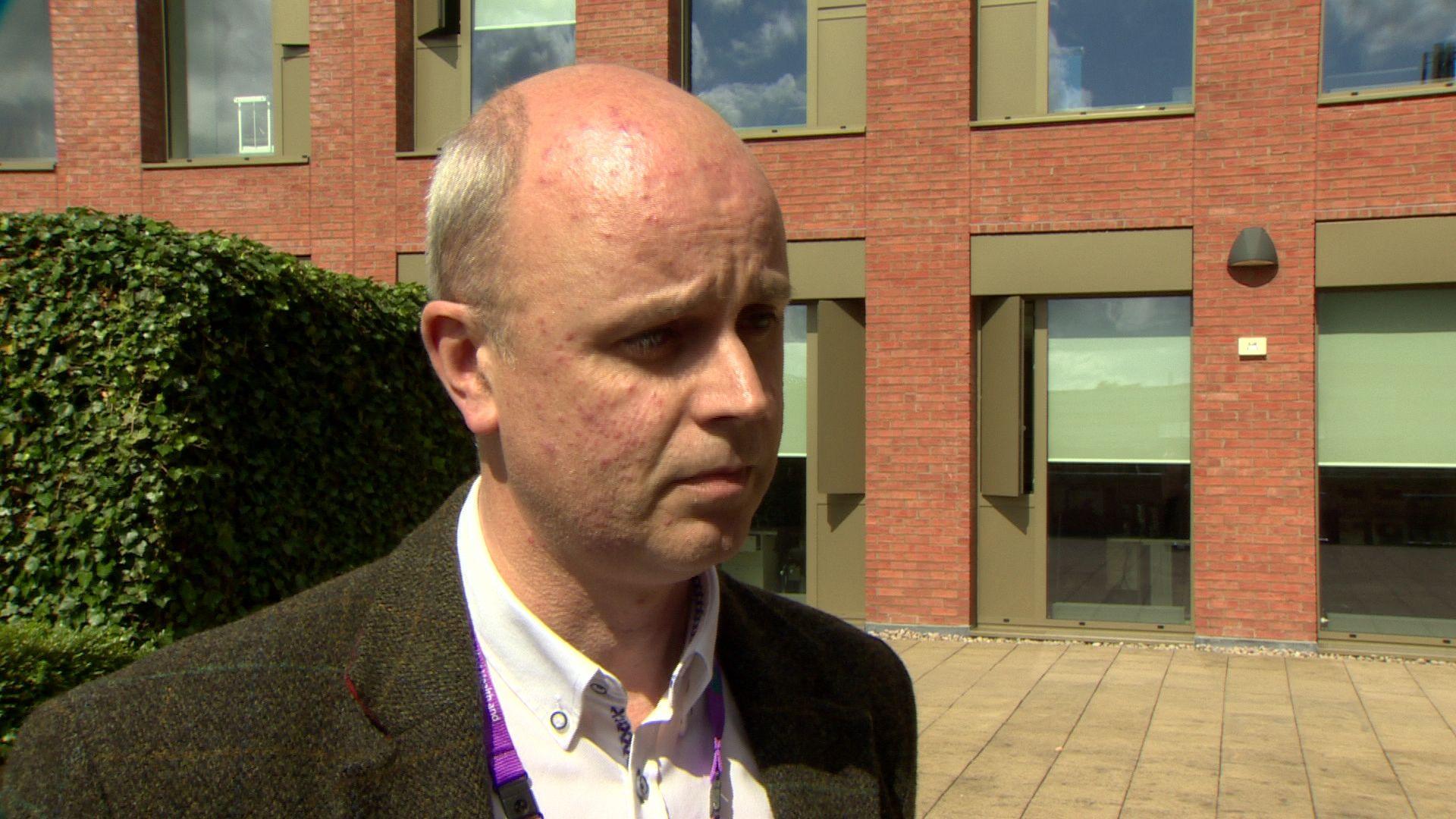
Dr Johnny Cash is chief clinical information officer at the Belfast Health Trust
Delayed appointments
Dr Cash said the South Eastern Trust had "plenty to learn and plenty to teach us about going live" and that changes had been made to the initial system.
In March, BBC News NI reported that appointments in the South Eastern Trust had been delayed due to the new patient record system.
Since its launch in November 2023, it has conducted a survey to explore the staff experience of the system.
It shows the average reported confidence level of respondents in using encompass is averaging five out of 10, a slight improvement over three months.
However, frustrations still exist around more training and support required, system functionality and navigation issues also reporting governance and safety concerns.
Dr Cash said this was not a concern, adding that while it would be "difficult for our staff", plans were there to support them.
Last week, BBC News reported that problems with NHS computer systems in England were linked to patient harm, but Dr Cash said he wanted to "reassure" the public that it was "a different system" and not related to the encompass programme which was being rolled out in Northern Ireland.
The encompass system has been built by a company called Epic which currently provides electronic records for more than 300m people within the UK and across the globe.
Related topics
- Published26 March 2024
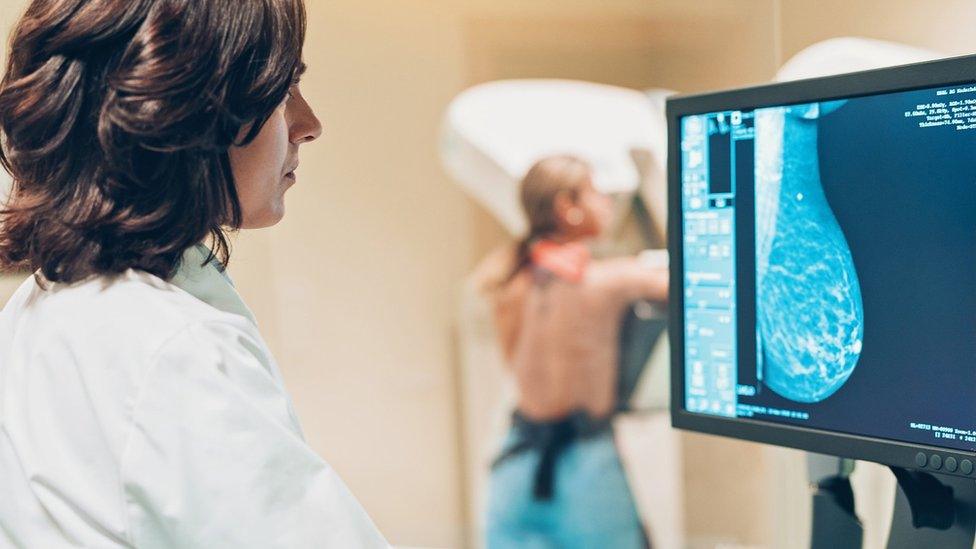
- Published30 May 2024

- Published2 May 2024
